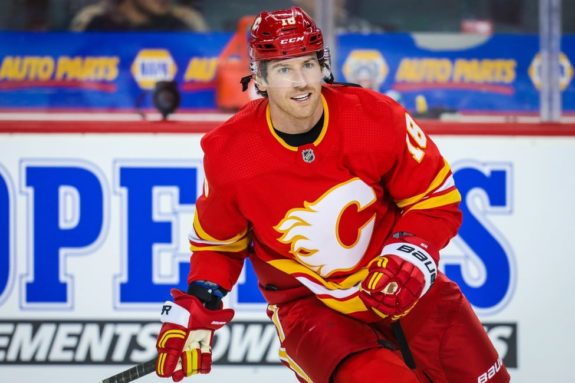In the summer of 2018, the Calgary Flames had a problem. Coming off a disappointing regular season result, management took their time to examine the team’s issues and enacted several big changes.

Heading into the summer of 2019, the Flames are coming off a bitterly disappointing playoff exit. But given the progress the team made over the prior year, it’s crucial that the Flames make the right changes and don’t try to make big changes for the sake of making changes.
2018’s Summer of Sweeping Changes
It might be easier to detail what didn’t go wrong for the Flames in 2017-18 rather than try to list out the things that caused challenges. Between roster construction issues, challenges with deployments by the coaching staff and a slew of late season injuries that exposed the team’s lack of farm depth, big changes were needed for the Flames.
Banking on a few prospects to go pro and back-fill their roster depth-wise, the Flames opted to change things up to address their roster construction and coaching:
- They brought in a new head coach (Bill Peters), associate coach (Geoff Ward) and assistant coach (Ryan Huska).
- They shipped out Dougie Hamilton (trade), Micheal Ferland (trade), Brett Kulak (trade), Troy Brouwer (buyout), Matt Stajan (free agency) and Kris Versteeg (free agency).
- They brought in Elias Lindholm (trade), Noah Hanifin (trade), James Neal (free agency), Austin Czarnik (free agency) and Derek Ryan (free agency), while rookies Dillon Dube, Rasmus Andersson and Juuso Valimaki spent much of the season on the NHL roster.
After their period of self-reflection, the Flames felt they needed to make seismic changes. They made such changes, turning over their entire depth forward and defensive groups and adding players to their top four defenders and their top six forwards to change up their composition.
These big changes seemed to work, as the Flames had their best regular season in three decades and finished second overall.
2019’s Summer of Tweaks (So Far)
Despite their strong regular season, the Flames faltered in the first round of the playoffs against the Colorado Avalanche. Management spent a similar amount of time mulling over the team’s failures and then came into the off-season with an apparent plan.
So far, the moves they’ve made have been tweaks around the margins of the roster designed to provide a bit of a different mix to the group. 37-year-old backup goalie Mike Smith was replaced by 32-year-old backup goalie Cam Talbot via free agency, a “buy low” proposition on a goalie coming off a rough year. More recently, the Flames swapped underachieving forward James Neal to the Oilers in exchange for similarly underwhelming veteran Milan Lucic – a deal designed to bring in a physical player better suited to a bottom six complementary role.
Neither major move the Flames have made really even constitutes a major move; Talbot is unlikely to diminish David Rittich’s spot as the Flames’ top goaltender, while Lucic won’t take ice time away from the likes of Johnny Gaudreau or Matthew Tkachuk.
Prudent Tweaks Rather Than Wholesale Changes
To be blunt, the Flames stumbled out of the starting blocks in the post-season and were eliminated in the first round in resounding fashion. The Avalanche were definitively the better team for five games, but that doesn’t diminish the fact that the Flames were a tremendously deep, effective and productive hockey club for an 82-game regular season.
Rather than blow the whole thing up, so far the Flames have made a couple tweaks – bringing in a goaltender with experience being a backup, while adding a physical veteran forward in place of one who had inconsistent engagement in games during the prior season. They have yet to make any major moves, which is a good sign.
The Flames made massive changes in the summer of 2018. Those changes, for the most part, panned out fairly well. A second summer of seismic shifts would probably push the boundaries of how much change the club could handle, but it would also be pretty unnecessary.
The Flames were a really strong hockey team in 2018-19. If they can avoid making too many changes, they seem primed to be good again in 2019-20.